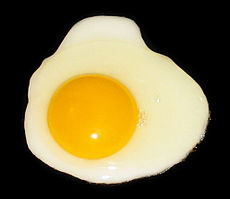If you was to pick one nutrition topic that hasn’t found an amicable conclusion it has got to be the one about eggs. Researchers world over have been and are still trying to determine whether scrambled eggs, omelets and fritatas are healthy food choices.
The long and protracted debate has always seemed to revolve around two main issues and that’s the high content of cholesterol and fats contained in eggs.
One therefore assumes that removing eggs from the diet completely or consuming just the egg yolk are the two most viable options if you want to have a healthy diet.
The heart of the issue however reveals deeper concerns which point to why there was ever any doubt about the health benefits of eggs to begin with.
Here’s the thing. By all standards, eggs should feature frequently in your diet and there are reasons why.
The next few paragraphs will highlight and demystify common myths linked to eggs and hopefully this will help you feel safe next time you list eggs as part of your shopping list, and give more information about egg nutrition.
Myth : Eggs result to added weight
Truth: Eggs are a perfect food choice for weight loss
If you have been struggling with weight loss issues and have finally decided to do something about it, chances are high that you have heard this myth. It’s often said that eggs will make you fat because 60% of calories found in eggs originate from fat.
The truth is that eggs contained controlled calories which help you lose weight not prevent you from shedding the extra weight. A single egg contains around 70 calories with a perfect balance of 5 grams of fat and 6 grams of protein. These perfect balance triggers your brain to release hormones telling your body that you’re full. The protein found in eggs also triggers the release of glucagon a hormone that stimulates your body to free up and use stored fat and carbohydrates.
And to prove this information, think about rice cakes (usually highly regarded as a diet food) in comparison to eggs. Two rice cakes contain 70 calories with no fat or proteins. The calories in these rice cakes originate from 14 grams of refined carbohydrates and fat cell stuffings. For this reason, rice cakes are a less healthy option.
Myth : If you have to eat eggs, eat only the egg whites
Truth: You can safely eat the whole egg
The egg white phenomenon came to be when the masses started propagating the intense need to get rid of fat and cholesterol from normal diet in a bid to fight obesity and heart diseases.
Did you know that only 3.5 grams of protein are found in an egg white and that all the other proteins, fats and nutrients are contained in the yolk? This means that if you want the nutritious part you have to eat the egg yolk. Yolks contain the most important amino acid you would need to push your body to build your muscles and that’s leucine.
That’s not all what egg yolks are good for. They also contain choline which is responsible for maintaining cell membrane functions as well as cholesterol that acts as the molecular connector for hormones found in the body. Egg yolks also contain Vitamins A, D and E.
Myth : Eggs cause a rise in cholesterol
Truth: Eggs have no effect whatsoever on cholesterol levels
Keeping cholesterol levels low has been a priority for every one since years back and this has not changed today. Common sense dictates that if you want to keep your cholesterol levels low then you should consume it in lesser amounts. The reason why eggs are associated with increased cholesterol levels is because they contain around 200mg per single serving.
Here’s the thing. Dietary cholesterol isn’t responsible for raising cholesterol to the alarming points. It’s true that 30% of people suffer high cholesterol when they partake in a high cholesterol diet. Research has continued to show that you can safely consume three eggs on a daily basis without negatively affecting your health.
